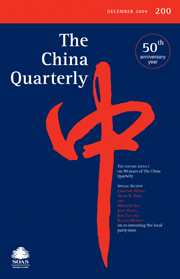In the wake of the controversy over Chinese government requests to censor academic journals, notably Cambridge University Press’ China Quarterly, two podcasts delve into issues relating to censorship and academia. On Sinica, Kaiser Kuo and Jeremy Goldkorn speak with Jim Millward of Georgetown University, author of one prominent critique of CUP’s actions, about the situation at China Quarterly:
What does the CUP fiasco mean for censorship and academic freedom in China? Why did CUP yield to the censorship pressure, and how should other academic institutions approach their operations in the country? In many ways, these questions are still unanswered, and Jim sat down with Kaiser and Jeremy to sort through what happened and discuss where it might lead.
At Little Red Podcast, Louisa Lim and Graeme Smith speak with several historians about the broader issues around censorship in academic research on Chinese history:
Western scholars of China are struggling to function in an environment with little access to historical records and increasingly sophisticated censorship of electronic archives, as well as more overt surveillance of their activities and pressure on their Chinese research partners. With censorship and intimidation reaching ever-greater levels of intensity, some are even drawing comparisons with Emperor Qianlong’s literary inquisition of the eighteenth century. Louisa and Graeme are joined by Glenn Tiffert from the Hoover Institution, Dayton Lekner from the University of Melbourne, and Timothy Cheek and Morgan Rocks from the University of British Columbia to discuss their recent experiences researching China. [Source]
In an August interview with CDT, Simon Fraser University’s Jeremy Brown recounted the challenges he has faced accessing historical archives in China:
CDT: What sort of timeframe has that closing up happened in?
JB: It has gotten progressively worse each year since 2005 in terms of the richness of what you could get at the flea market … but that’s the bigger cities. I’ve heard from people going to smaller towns and smaller cities that haven’t really been tapped yet, that you can still get really good stuff.
But the archival closing seems to have been since 2012 or 2013, of archives saying “sorry, we’re digitizing, so we can’t let you in at all,” or “sorry, we’re renovating, we can’t let you in at all.” And these are euphemisms, just trying to get you to go away. [Source]
While efforts to censor Western publications can be thwarted by the publications themselves, as they were by the Journal of Asian Studies, the situation is much more restrictive for Chinese researchers. Starting in 2014, the Party escalated a campaign against Western values in Chinese universities, imposing restrictions on curriculum and requiring “ideological oversight” of teaching staff. Jane Puckett, who is on the executive committee of the China Quarterly, has called on international universities to beware of increasing censorship within China. Holly Else reports for Times Higher Education:
Jane Duckett, director of the Scottish Centre for China Research at the University of Glasgow, said that universities should be aware of the changes going on in the Asian country, which is experiencing a clampdown on Western ideas ahead of the Congress of the ruling party later this year.
She added that it is too soon to say whether academics need to change their approach when dealing with the communist country, as others have suggested, because it was not yet clear whether the restrictions will be lifted after the key political event.
[…] Professor Duckett said that the level of censorship imposed in China has fluctuated over the years and in recent times has tightened up. “Whether it continues or gets worse and how far it will go, we don’t know. Whether the international academic community need to change their engagement with China will depend partly on what happens next,” she said.
But she added: “Academics have to be alert to the changes that are going on. Already Chinese colleagues are having to be more careful in what they say and do. Chinese academics within China are increasingly likely to be criticised for espousing Western ideas and they may find it more difficult to openly discuss certain topics than in the past.” [Source]
Read more about China Quarterly’s acquiescence, and later reversal, of the government’s censorship order, and about the broader ideological campaign in Chinese universities, via CDT.








